
The historian Thomas F. Madden described the United States as “an empire of trust,” a phrase he fashioned to compare modern America with the golden era of the ancient Roman Republic. According to Madden, both the American and the Roman republics grew into sovereign powerhouses because external threats stimulated the drive to expand their boundaries of geopolitical influence by means of superior military might, used to transform enemies into allies.
Throughout history, there have been many empires of conquest. But only the republics of Rome and America, according to Madden, serve as history’s sole empires of trust. That’s something to bear in mind Saturday, which is Armed Forces Day. We citizens of the United States should be proud of our republic’s standing as an empire of trust. As the world’s economic and military superpower, we have achieved in the last seven decades a “Pax Americana” that has generated a relative global political and economic stability compared with previous eras.
The American taxpayers, by financially funding our national defense, have played a vital part in building this Pax Americana. In 2011, the United States spent $711 billion on military expenditures, about 4.7 percent of our gross domestic product, putting us in the lead position (at 41 percent) in the world’s share of defense dollars, according to the Stockholm International Peace Research Institute. China came in No. 2, having spent $143 billion for military expenditures, about 2 percent of its GDP and 8.2 percent of the world’s share of defense dollars.
The United States helps empower the economies of other nations, a role much like the Roman Republic played more than two millenniums ago. Other countries save billions of dollars for defense each year because America foots the bill for our own Armed Forces to keep peace for their people. But the United States wins, too. Since the end of World War II, the world’s increasing geopolitical stability has provided a market place in Europe and Asia that is relatively free of the risk of war, thus promoting more commercial enterprise for us.
Pax Americana also benefits the global economy though science and technology. The Internet, computers, GPS, cell phones and other equipment that shape our modern world have generated wealth for American citizens and added convenience to our lives. The basic science for these devices came from U.S. defense research projects. That technology has, in many ways, spread across the world and transformed its geopolitics – most notably and most recently with the Arab Spring, which sprung up thanks in large part to ordinary digital communication devices.
Most importantly of all, the American men and women serving their nation in military uniform have played a vital part in building Pax Americana. The training they receive has shaped them as leaders in politics and business. Many of them have benefited by using the G.I. Bill to pay for college, which leads to career opportunities and the enhancement of our economy. Pax Americana has also led to humanitarian aid given by members of the American military to the people of other countries. This humanitarian aid provided by the Armed Forces can be one of the most cost-effective tools of national defense. And it’s far too underutilized.
On Armed Forces Day, let’s consider the price that uniformed Americans pay in the defense of the United States and other nations. Although there are benefits that come from serving in the military, there are personal sacrifices, too – sacrifices to physical health, mental wellness, family and careers. The stress of military service is high. According to the Department of Veterans Affairs, an average 18 veterans commit suicide every day. Unfortunately, American society does not fully appreciate these costs. Considering the benefits the United States receive from Pax Americana, we must find ways to better compensate military men and women, and their families, for their sacrifices and years of service.
In the 19th century with the rise of nationalism, people thought war was a good thing – that it provided economic benefits, inspired technological breakthroughs and enhanced national patriotism. Two world wars in the 20th century destroyed that foolish notion. With the aftermath of WWII, the United States became an empire of trust, creating a Pax Americana that has benefitted the world and reduced the possibility of conflict. Armed Forces Day should give us cause to pause and consider the American men and women who serve – and have served – in military uniform who made this great achievement possible.











